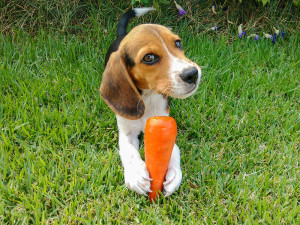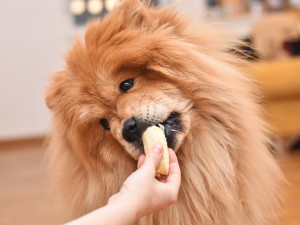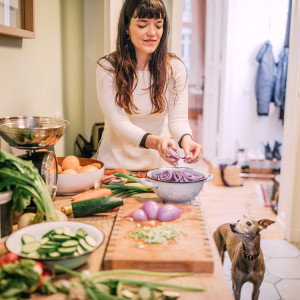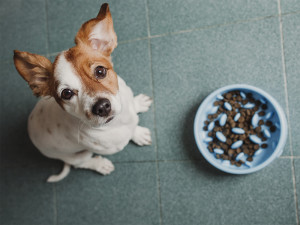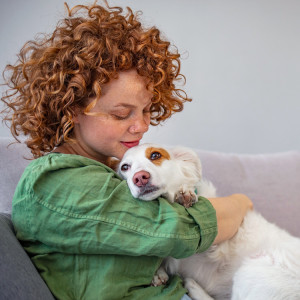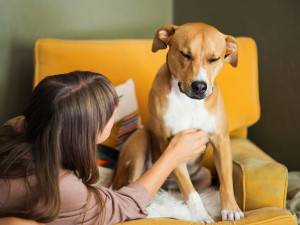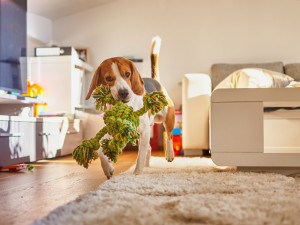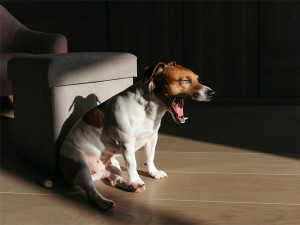Can Dogs Eat Corn Cobs?
Why you should never let a dog make a chew toy out of this food at a barbecue.

Share Article
If you’re preparing for one of your first cookouts of the summer season, you’ll want to be sure your pup can enjoy the festivities without getting into too much trouble. While there are some safe foods you can share with your dog during barbecue season, corn cobs are definitely not one of them.
Read on to learn more about why you should keep corn cobs far out of reach of your pup.
Nutrition facts about corn for dogs
Corn itself can be safe for dogs if they just eat the kernels, or certain products made from corn. In fact, many commercial dog foods use corn as a healthy source of certain nutrients. Corn is an energy-packed food that can provide fiber, and prevents constipation, as well as starchy carbohydrates which are a good source of energy. Additionally, corn contains important vitamins and minerals such as zinc, magnesium, copper, iron and B vitamins that are necessary for daily biological functions. Corn cobs, however, are a different story.
Are corn cobs good for dogs?
Corn cobs are not good for dogs and can pose serious dangers to them if ingested. The problem with corn cobs is that they are extremely fibrous, made from a plant material called cellulose that is difficult to digest and break down. Corn cobs are also just the right shape to be small enough for most dogs to chew on, but too big to easily pass through their digestive tract. This leads to the following risks:

Choking hazards: Due to their size and shape, it is easy for most dogs to chew on corn cobs. Because they are made of plant fiber, dogs with strong teeth and jaws can often break them apart. Large pieces that they attempt to chew and swallow can become a choking hazard.
Intestinal blockage: If a dog succeeds in swallowing pieces of corn cob, this may lead to a life-threatening condition known as an intestinal blockage. The pieces of corn cob are not broken down in the stomach but pass through the digestive tract whole. Often, they are too large to pass through the narrower parts of the intestines and can get stuck. This leads to serious pain, vomiting, and other symptoms. Emergency surgery is almost always required to remove the blockage.
Digestive upset: Even if a dog is able to chew up the corn cob into small bite-sized pieces, they can still cause problems. These highly fibrous fragments can be sharp and irritate the digestive tract on their way down. All of that excess fiber can also cause bloating, gas, vomiting, or even diarrhea.
Can dogs eat corn kernels?
Yes, cooked corn kernels are safe for dogs in moderation. As long as they are served plain, without high fat oils, butter, or potentially toxic seasoning like garlic and onion powder, corn kernels are safe for dogs. They are high in starch and fiber, though, so eating large amounts of corn is not a good idea.
Too many starchy carbohydrates can add unnecessary calories to the diet, leading to weight gain and related health problems. At the same time, too much fiber at once can cause digestive upset including bloating, gas, vomiting, or diarrhea.
Are corn cobs completely safe for dogs?
Corn cobs are not completely safe for dogs and in fact, pose many dangers. They should be kept far out of reach. Your dog should be carefully supervised at barbecues and other parties where food may be accidentally left at their level. Be sure to keep trash well-contained; dogs have been known to tear into trash if they smell delicious scraps, too.
If you suspect your dog has eaten a corn cob, or any other inedible materials, such as skewers, fruit pits, bones, plastic, and the like, be sure to contact your vet right away. Even if your dog is acting fine initially, it is better to be proactive than to wait until they are sick. Sometimes, if dogs are seen right after eating something, a vet can induce vomiting, or use an endoscope to remove it from the stomach before it has a chance to get stuck lower in the intestines. This can save your dog from more serious discomfort and more invasive surgery.
If your dog does show signs, including vomiting, refusing to eat, lethargy, and/or an upset stomach, be sure to get to an emergency clinic right away. Foreign objects like corn cobs often need to be surgically removed and the longer they are stuck, the more damage they can do.
The bottom line: Can dogs eat human food?
The good news is that dogs can eat some human food, and there are many options for safe and healthy foods you can share with your pup. Corn cobs are a good example of why it is so important to educate yourself on the foods that are potentially dangerous or toxic, so that you can keep your dog safe. When it comes to foods that are good to share, whole foods like lean meats without any seasoning, skin, or bones, as well as plain fruits and vegetables are good options.
Prepared foods with lots of different ingredients can be more risky, as they are more likely to contain oils or high fat ingredients that may lead to digestive upset or pancreatitis, as well as possible toxins like garlic, onions, and more. If in doubt, check the ingredients, and speak with your vet before sharing a new food.
And while we love to dote on our pets and spoil them with delicious treats and snacks, it’s also important to remember that dogs have their own unique nutritional needs. They really need to eat a balanced dog food diet in order to stay healthy. If they are eating too many table foods and snacks, they may not get enough of the nutrients they really need to prevent nutritional deficiencies and related illnesses. As a general rule, table snacks and treats should be less than 10 percent of their daily intake. This ensures that the bulk of their diet comes from a balanced dog food and that they are not overeating.
Other foods that are safe for dogs
Green beans can be a crunchy snack.
Shrimp can be shared with a few caveats.
Apples are another good choice for sharing.
Other foods that are dangerous
Rib bones are another food to keep out reach.
Chocolate is toxic for dogs.
Cheese can also be unhealthy, especially in large amounts.
FAQs (People also ask):
How much corn can a dog eat?
Plain, cooked corn kernels are OK in moderation but dogs should never be fed corn cobs.
Is it OK to give dogs corn cobs?
No; corn cobs are not safe for dogs as they cannot digest them and they can cause intestinal blockages.
Why do dogs like corn cobs?
Dogs often like the taste of the cob since it has remnants of whatever seasoning was on the corn.
Can dogs eat corn?
Plain, cooked corn kernels are safe for dogs to eat in small amounts.
References:
North Dakota State University: History of Cornopens in new tab
US Department of Agriculture: Corn Nutrition Factsopens in new tab

Dr. Amy Fox, DVM
Amy Fox, DVM is a small animal veterinarian in New York City with over thirteen years of experience in a mixture of general practice, emergency medicine, and shelter medicine. A lifelong animal lover, Dr. Fox studied biology in college and then worked as a veterinary nurse before pursuing veterinary school at Cornell University. Her expertise includes surgery, dentistry, and management of chronic conditions, and she is interested in toxicology, pain management, nutrition, care of senior pets, and educational outreach. Dr. Fox also enjoys writing about veterinary medicine and teaching, and her work has previously appeared in Spruce Pets. In her free time, she loves to cook, garden, go for long runs, and hang out with her goofy mixed-breed dog May, who provides never ending comic relief!
Related articles
![Puppy looks up while sitting next to a puzzle toy with food.]()
How to Slow Down a Dog Who Eats Too Fast
Plus 6 stylish slow-feed dog bowls.
![Woman Feeding Her Dog During Dinner]()
How to Train Your Dog in Social Graces
Because nobody wants your pup eating the host’s charcuterie platter.
![Woman with her dog relaxing in living room.]()
How to Tell If Your Dog Is Sick
Look out for these warnings signs so you know when to call the vet.
![A pet parent checks their dog's stomach.]()
DIY Physical Exam Part 4—How to Examine Your Dog’s Stomach and Skeleton
Veterinarian Dr. Shea Cox on how to properly examine your dog’s stomach and musculoskeletal system.
![Beagle dog fetching a green rope in a dog-proofed living room.]()
How to Dog-Proof Your Home
Our room-to-room guide to get your house in dog-safe shape.
![A dog with its eyes closed and mouth open sitting on a hardwood floor.]()
How to Help a Choking Dog and Prevent Choking In the First Place
Learn about the causes and what to do for a choking pet.
Can Dogs Eat Rib Bones?
It’s about to be barbecue season, but that doesn’t mean your pup should take part.


